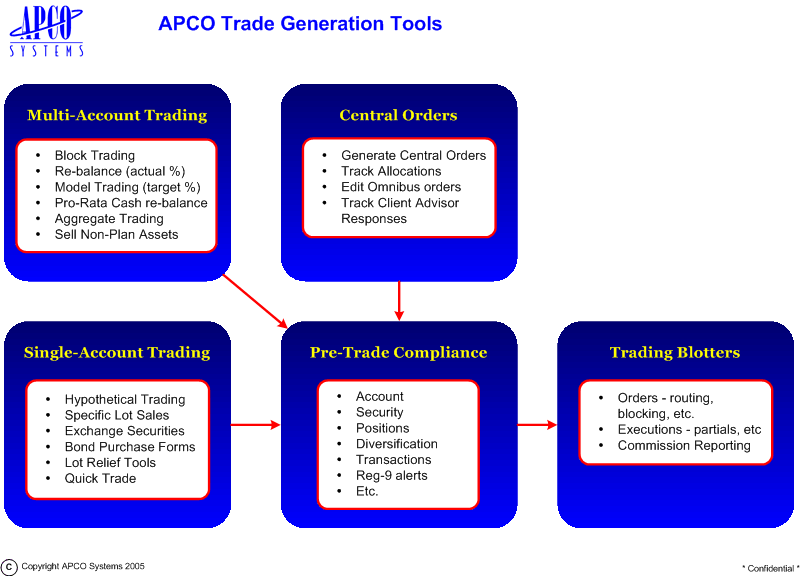Reports
The APCO System is responsible for generating all the trade data that is required for the settlement process. This requires extensive reporting for custodians, brokers, wealth managers, traders, auditors, and departmental managers. Below are just a few examples of the types of reports the system generates.
Broker Commission Reports
Tabulates the commission pools (soft-dollar, research, execution, etc.) for each broker. The trader uses this information to determine which broker to route certain orders to.
Custodian Settlement Instructions
This report breaks down the omnibus fill into the most granular custodian-account allocations. This includes registration and tax lot reduction information. Each custodian will need this information for the DTC affirmation process.
High Profile Trade Report
This is a management report detailing any trades above a certain size.
Investment Officer Trade Tracking
This allows the Investment Officers to review the status of their pending trades.
Broker Allocation Reports
When orders are blocked together across custodians or multiple settlement instructions for best (and consistent) execution, this report breaks down the omnibus fill by settlement requirements. Each broker will need this information for the DTC confimation process
Execution Reports
Allows traders to review all of their trade activity from that day. For each trade, this report shows the amount executed and with whom, as well as the amounts left open for future trading. This is also used by the traders when talking to brokers and operations about any trade discrepancies.
Bulleted List
Compliance Reports
- Current Activity: Allows compliance officers to review all current compliance events. The report includes information about which compliance event was triggered, by whom and when, and the current status. If the status has been approved then this shows by whom and when.
- Historical Reports: Allows compliance officers to conduct historical reviews by account or by wealth manager.
- Scheduled Reports: Post trade compliance can be set up to run on a scheduled basis. These reports are designed to identify when a portfolio has drifted out of compliance (e.g. a percent weighting has changed due to the underlying valuations, etc.)
Historical Execution Reports
This allows traders and administrators to review any historical trade activity. This includes drill-downs to trade audit information on things like who was the IO, when did he/she release the order, when was the order sent to the broker, when was it executed, etc. This is essential for SEC audits.
Daily Trade Report
Each wealth manager receives a trade report showing their trading activity for that day.

